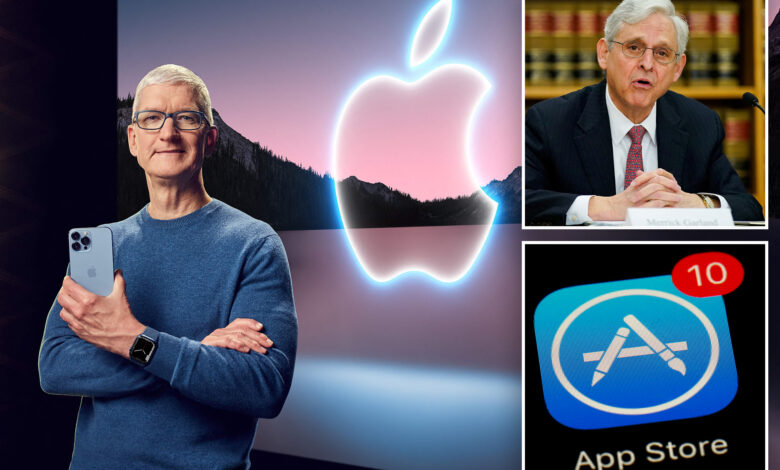Apple uses illegal monopoly to ensure iPhone’s dominance: DOJ

Apple is violating antitrust laws by blocking fair competition to ensure the dominance of its iPhone, the Justice Department alleged Thursday in a long-awaited federal lawsuit that could upend the business model of the world’s second-most valuable company.
Filed in a New Jersey federal court by the DOJ and 16 state attorneys general, the lawsuit alleges that Apple has maintained an illegal monopoly over the smartphone market through unfair tactics, such as onerous App Store fees and restricted developer access to key features of its products, resulting in higher prices and fewer choices for American shoppers.
“Consumers should not have to pay higher prices because companies violate the antitrust laws,” US Attorney General Merrick Garland said in a statement. “We allege that Apple has maintained monopoly power in the smartphone market, not simply by staying ahead of the competition on the merits, but by violating federal antitrust law.”
The landmark lawsuit is arguably the most significant enforcement action taken against Apple to date by the DOJ, which has now sued the company three times over the last 14 years. The DOJ is also locked in an ongoing legal battle with Google over alleged antitrust violations, while the Federal Trade Commission has targeted Meta and Amazon.
Led by CEO Tim Cook, Apple was already in the midst of a heated public war of words with “Fortnite” maker Epic Games over its App Store practices – including its policy of taking a 30% cut of purchases made within the App Store – and intense regulatory scrutiny in Europe.
Apple shares were down 2% in early trading Thursday. The Cupertino, Calif.-based tech behemoth has a market cap of $2.71 trillion, trailing on Microsoft’s $3.16 trillion.
Apple said the “lawsuit threatens who we are and the principles that set Apple products apart in fiercely competitive markets.”
“If successful, it would hinder our ability to create the kind of technology people expect from Apple —where hardware, software, and services intersect,” the company said in a statement. “It would also set a dangerous precedent, empowering government to take a heavy hand in designing people’s technology. We believe this lawsuit is wrong on the facts and the law, and we will vigorously defend against it.”
Apple held a whopping 64% share of US smartphone sales in the fourth quarter of 2023, according to data from Counterpoint Research. Its next closest competitor, Samsung, had an 18% share.
The iPhone maker posted net sales of $383 billion and net income of $97 billion in fiscal 2023 alone. The DOJ noted that its net income “exceeds any other company in the Fortune 500 and the gross domestic products of more than 100 countries.”
“For years, Apple responded to competitive threats by imposing a series of ‘Whac-A-Mole’ contractual rules and restrictions that have allowed Apple to extract higher prices from consumers, impose higher fees on developers and creators, and to throttle competitive alternatives from rival technologies,” DOJ antitrust chief Jonathan Kanter said.
“Today’s lawsuit seeks to hold Apple accountable and ensure it cannot deploy the same, unlawful playbook in other vital markets.”
Apple’s alleged anticompetitive tactics have included the imposition of steep fees and tough contract restrictions on developers within its App Store, limiting the performance of outside products such as smartwatches and nixing third-party products such as messaging apps and digital wallets that threatened its empire, according to the suit.
“Rather than respond to competitive threats by offering lower smartphone prices to consumers or better monetization for developers, Apple would meet competitive threats by imposing a series of shapeshifting rules and restrictions in its App Store guidelines and developer agreements that would allow Apple to extract higher fees, thwart innovation, offer a less secure or degraded user experience, and throttle competitive alternatives,” the lawsuit says.
Prosecutors also pointed to Apple’s conduct to impede rival “super-apps” and cloud-based gaming as key areas of concern.
During a press conference, Garland noted Apple texts with Android phones have limited functionality, such as a lack of encryption or typing indicators, to encourage customers to stick with iPhones.
The DOJ’s lawsuit cites a Vox Media’s Code Conference in 2022 that Cook attended in which he was asked to improve text messaging between iPhones and Androids because the person couldn’t “send my mom certain videos”.
Cook responded: “Buy your mom an iPhone,” according to the complaint.
Wedbush analyst Daniel Ives noted the DOJ’s lawsuit will likely be a years-long headache for Apple.
“We do not expect any business model changes for now, but Apple clearly is going to have to find a way to eventually settle this case, pay a hefty fine, and ultimately find some compromise with developers on the App Store structure down the road,” Ives said in a note before the DOJ filed the lawsuit.
“This adds to the Epic Games case which has challenged the App Store structure and remains a fluid situation.”
As The Post reported, Apple had engaged in a major charm offensive on Capitol Hill ahead of the antitrust crackdown, with company executives and lobbyists landing meetings at the White House at least 87 times since President Biden took office.
Cook personally visited the White House at least 11 times for listed meetings with at least 14 officials since 2021.
Competition watchdogs have expressed concerns that Apple could lean on ties with the Biden administration to potentially skirt a meaningful antitrust crackdown.
The DOJ’s previous two lawsuits against Apple since 2010 were narrower in scope than the iPhone complaint.
An antitrust suit filed in 2010 alleged that Apple, Google and four other companies illegally colluded to not poach each other’s employees. That case resulted in a settlement.
The feds also successfully sued Apple in 2012 for engaging in a price-fixing scheme related to e-books. A judge ordered Apple to submit to a third-party review of its antitrust policies.




